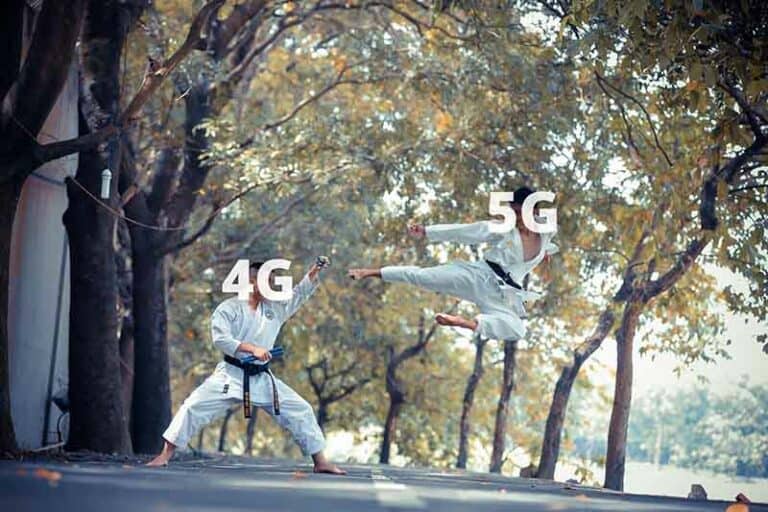
Fiber
More and more businesses are offering “free” Wi-Fi. Why don’t you take advantage of this?
We’ll take care of your connection
A no nonsense network for every sector
Our knowledge accumulated through years of expertise
A company with a passion for technology and signals
 English
English
As you probably know, 5G is the successor to 4G, but what does 5G mean? The “G” stands for generation. So this means that this is the 5th generation of mobile network technology. With the arrival of 5G, they want to ensure the fastest possible mobile communication and connect an even greater number of devices to the internet at the same time.
One of the main advantages of 5G over 4G is the speed at which it operates. So, how much faster is 5G?
5G would be able to download data 100x faster than its predecessor. This means that downloading movies, which would normally take 6 minutes on a 4G network, is now possible in about 4 seconds thanks to 5G. In technical terms, 4G technology supports download speeds of12 to 36 megabits per second (Mbps). 5G, on the other hand, should support speeds of 300 Mbps or more.
Download speeds are not the only thing to consider when it comes to transfer speed. While we don’t have comprehensive insights into upload speeds yet, users can expect an increase in overall upload speed of 30% or more. That brings the upload speed between 25 and 100 Mbps.
This increase in upload speed can mean a significant increase in efficiency for anyone backing up files or uploading large videos. It can also lead to increased productivity for people who work from home.
When comparing speeds, it’s important to remember that speeds are variable and depend on multiple factors. These factors include the mobile phone, the network, the number of users on the network, your location, etc.
Network latency refers to how much time it takes data to get from point A to point B. In other words, network latency is the time span between your mobile phone sending data and the device on the other end receiving it.
The latency is determined by factors such as the speed of the network, the available bandwidth, the size of the data being sent, etc. 5G would allow users to send data (even large files) in real time. This could become an essential application for emergency services and public safety that need critical information at a moment’s notice.
5G can operate on the same and higher frequencies as 4G. Each country decides for itself which frequencies they use. These higher frequencies allow the technology to achieve greater speeds.
However, there is a downside. The higher the frequency, the harder it gets for signal to penetrate buildings. This can be challenging for indoor use, in mountainous areas and in cities where the signals may need to travel through buildings.
This is where Mercuron can lend you a hand. Do you have poor reception in your company building, parking garage, hotel, etc.? Our mobile phone amplifier solves it! The equipment we use fully supports 5G.
When we talk about 5G on a higher frequency, we can clearly say that it has a shorter range than its predecessors. This is due to its higher frequency and the fact that it has difficulty penetrating objects. Later rollouts will most likely use other frequency bands that can provide a wider range.
We cannot give a clear answer about 5G on the same frequency as 4G, but we can already say that the range will be at least as good as that of 4G.
This is also the reason that 5G will not completely replace its predecessor. It could easily take until 2025 before 5G becomes the dominant technology in Belgium. The deployment of 5G will now mainly be in large cities and more particularly in places where it is very busy, so that large groups of people can benefit from the lightning-fast 5G technology at the same time.
The full rollout of 5G is not yet for the foreseeable future, but telecom experts agree that 5G will soon become the new standard. It promises a big change in the telecom market, both for companies and ordinary users.

Xavier is the driving force behind Mercuron. As CEO and co-founder, he brings new communication technologies to all buildings.

More and more businesses are offering “free” Wi-Fi. Why don’t you take advantage of this?

Being accessible at all times and places is expected. What does this mean for your business?

The SAR value is an indication of how much electromechanical radiation is emitted.

Mercuron, a Belgian company, specializes in wireless communication. With our expertise in radio waves, we create ASTRID and mobile phone signal amplifiers from the ground up.